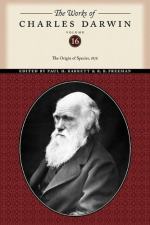We have seen that in each country it is the species of the larger genera which oftenest present varieties or incipient species. This, indeed, might have been expected; for as natural selection acts through one form having some advantage over other forms in the struggle for existence, it will chiefly act on those which already have some advantage; and the largeness of any group shows that its species have inherited from a common ancestor some advantage in common. Hence, the struggle for the production of new and modified descendants, will mainly lie between the larger groups, which are all trying to increase in number. One large group will slowly conquer another large group, reduce its numbers, and thus lessen its chance of further variation and improvement. Within the same large group, the later and more highly perfected sub-groups, from branching out and seizing on many new places in the polity of Nature, will constantly tend to supplant and destroy the earlier and less improved sub-groups. Small and broken groups and sub-groups will finally tend to disappear. Looking to the future, we can predict that the groups of organic beings which are now large and triumphant, and which are least broken up, that is, which as yet have suffered least extinction, will for a long period continue to increase. But which groups will ultimately prevail, no man can predict; for we well know that many groups, formerly most extensively developed, have now become extinct. Looking still more remotely to the future, we may predict that, owing to the continued and steady increase of the larger groups, a multitude of smaller groups will become utterly extinct, and leave no modified descendants; and consequently that of the species living at any one period, extremely few will transmit descendants to a remote futurity. I shall have to return to this subject in the chapter on Classification, but I may add that on this view of extremely few of the more ancient species having transmitted descendants, and on the view of all the descendants of the same species making a class, we can understand how it is that there exist but very few classes in each main division of the animal and vegetable kingdoms. Although extremely few of the most ancient species may now have living and modified descendants, yet at the most remote geological period, the earth may have been as well peopled with many species of many genera, families, orders, and classes, as at the present day.
SUMMARY OF CHAPTER.
If during the long course of ages and under varying conditions of life, organic beings vary at all in the several parts of their organisation, and I think this cannot be disputed; if there be, owing to the high geometrical powers of increase of each species, at some age, season, or year, a severe struggle for life, and this certainly cannot be disputed; then, considering the infinite complexity of the relations of all organic beings to each other and to their conditions




